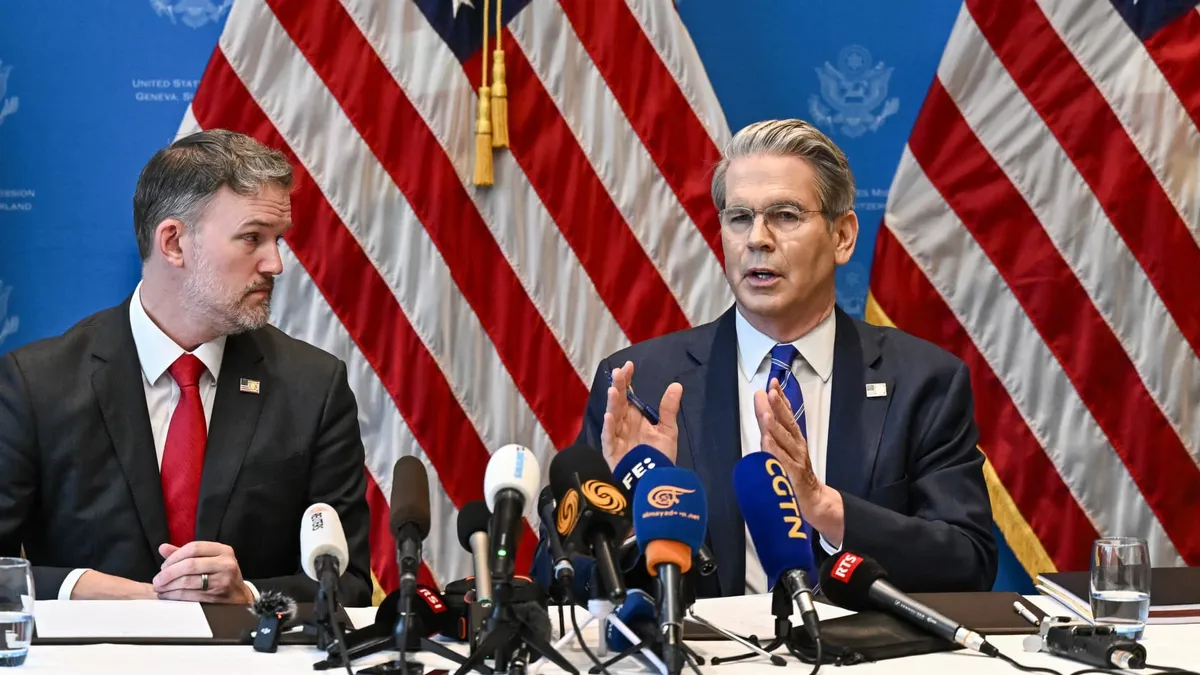
Market watchers are hailing the new U.S.-China deal to temporarily cut tariffs as a significant and favorable development for investors. The agreement includes a sharp reduction in reciprocal tariffs, which will decrease from over 100% to just 10% on both sides. While the Trump administration will maintain a 20% tariff on fentanyl-related imports from China, this means that the overall tariff rate on Chinese imports will now stand at 30% during the 90-day pause.
Following the announcement of the U.S.-China tariff agreement, stocks surged in both Europe and Asia. The Stoxx 600 index in Europe climbed 1%, while Germany's DAX reached a one-year high. In Hong Kong, shares jumped approximately 3%. On Wall Street, U.S. stock futures indicated a strong rally, with Nasdaq futures soaring by 3.8%, S&P 500 futures increasing by 2.8%, and Dow Jones Industrial Average futures up by 3.1%.
Analysts and strategists suggest that this new arrangement could reignite a risk-on sentiment in the market, favoring stocks and U.S. assets. Tai Hui, chief market strategist for Asia Pacific at JPMorgan Asset Management, noted that while the deal exceeded expectations, some uncertainty still looms. He emphasized that the magnitude of the tariff reduction is larger than anticipated but cautioned that reaching a more solid trade agreement within just three months may prove challenging.
Jordan Rochester, head of currency strategy at Mizuho Bank, also expressed that the deal is better than expected and may signal the end of the "Sell America" narrative. This narrative has contributed to significant volatility in U.S. assets, including the dollar, Treasurys, and stocks. On the morning of the announcement, the U.S. dollar index rose by 1%, while the yield on the benchmark U.S. 10-year Treasury note increased by 6 basis points.
According to Rochester, the effective tariff rate for Chinese companies will drop dramatically from 108.8% to 27%. This reduction surpasses market expectations, which anticipated a decrease to the 50-60% range. The language used during the press conference suggested that talks could continue beyond the initial 90 days, provided they remain constructive.
The new U.S.-China agreement has led to optimistic projections from Wall Street strategists. Emmanuel Cau, head of European equity strategy at Barclays, noted the significant rebound in stocks but highlighted ongoing disparities between domestic and export-focused companies. He suggested that the current conditions could allow for further stock price increases.
Strategists at Deutsche Bank have reported a marked increase in their market sentiment following the announcement. They predict that U.S. stocks will outperform European stocks in the short term, asserting that the deal has exceeded even their optimistic expectations.
Mikkel Emil Jensen, senior analyst at Sydbank, characterized the 90-day tariff pause as a major step towards de-escalating the U.S.-China trade war. He pointed out that this agreement reduces uncertainty surrounding global trade and could positively affect demand for container freight. Following the announcement, shares of shipping giant Maersk surged over 12%.
This temporary deal may also encourage companies to increase their inventories in anticipation of potential future trade war escalations, further stimulating economic activity.
Wedbush's Dan Ives described the agreement as a significant win for the market, suggesting that it is just the beginning of more comprehensive negotiations to come. He anticipates that tariff numbers will continue to decline significantly in the months ahead, potentially leading to new market highs, particularly for tech stocks, by 2025.
The resumption of trade between the world's two largest economies is expected to reverse the decline in freight vessels and shipping containers that has occurred since the tariffs were initially announced in April. Investment strategist Lindsay James noted that while the new deal does not fully restore previous tariff levels, it will allow a considerable portion of trade to resume at slightly higher prices.
As the U.S.-China tariff agreement unfolds, its implications are likely to resonate throughout the global economy, presenting opportunities for investors and potentially fostering a more stable trading environment.